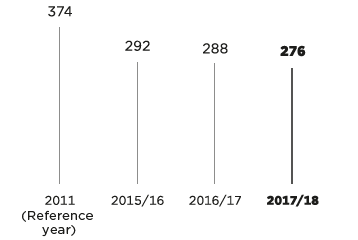Environmental matters
A responsible consumption of energy and other natural resources is crucial for all of us. The use of resources has a direct effect on our operating costs and may entail undesirable environmental implications, such as the emission of climate-damaging greenhouse gases. Our approach is to reduce the climate-relevant emissions caused by our business operations and our consumption of natural resources. 1 We do this by focusing on behavioural change (Energy Awareness Programme) and investment aimed at increasing our energy efficiency (Energy Saving Programme). Wherever possible, we are also converting our cooling systems to natural refrigerants (F-Gas Exit Programmes). This reduces our energy requirements as well as our costs. In financial year 2017/18, among other things, we invested €10 million in METRO Wholesale’s Energy Saving Programme, which saves us approximately €2.8 million in energy costs each year. Examples of measures in the reporting year are:
- Commissioning of further transcritical cooling systems, including in Bulgaria, Russia and China
- Opening of the third green store in China with significantly reduced energy requirements compared to conventional METRO stores
- Installation of additional photovoltaic systems and expansion of the total capacity to more than 19,000 kWp. In China, Germany, Pakistan, India and Japan, we use the latest technical equipment.
- Measures for heat recovery in a number of markets
- Conversion from diesel to compressed natural gas (CNG) in some markets in Bulgaria
Further key focal issues in relation to sustainable business operations are the prevention of waste, the reuse of resources and their recovery by means of recycling. The reduction of food waste is an issue of particular importance to the operations of METRO. Every food product that is sorted out or discarded instead of being eaten represents wasted economic, social and environmental resources. METRO has therefore committed itself to the Resolution on Food Waste by the Consumer Goods Forum (CGF) and thus to eliminate 50% of wasted food in our own operations by the year 2025 compared to 2016. For this purpose, a working group focusing on waste was established in financial year 2017/18 as part of our Operations Federation, and the Food Loss and Waste Protocol was implemented in a pilot country.
Status of climate protection target
From October 2017 to September 2018, METRO generated 276 kilograms of CO2 equivalent per square metre of selling and delivery space. This figure is down from 288 kg in the previous year’s period. Our goal is to reduce these emissions to 187 kg by 2030, for example 50% of the 2011 figure. In particular, we focus on the aforementioned programmes. In financial year 2017/18, we switched to a different software for our sustainability data management. This also involves methodical changes and new emission factors for calculating greenhouse gas emissions. In addition to our selling space in square metres, we also apply our climate protection target to spaces used for deliveries to account for the rapidly increasing proportion of deliveries that forms part of our business. Overall, this accounts a positive effect of 2.5 percentage points regarding our target achievement.
Climate protection target status
Greenhouse gas emissions in kg CO2 (CO2 equivalent) per m2 of selling and delivery space

1 Due to the company size and alignment (management), the aspect of environmental matters is not significant for the holding company METRO AG.